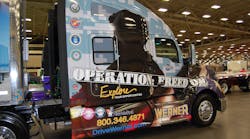DALLAS. Executives from three top U.S. truckload carriers – Covenant Transportation Group, Swift Transportation, and Werner Enterprises – believe the driver shortage is becoming a far more acute problem than ever before in the industry’s history, while what the view as an “excessive” level of government regulation is “stifling” not only trucking’s performance by the nation’s economic capability as well.
“The driver shortage has been one of our biggest issues for 50 years, but now it’s reached a level we’ve never seen before,” noted David Parker, Covenant’s founder, chairman, and CEO, during a panel discussion here at the 2015 Great American Trucking Show.
On top of that, stricter metrics within the Compliance Safety Accountability [CSA] program implemented by the Federal Motor Carrier Safety Administration [FMCSA] several years ago has eliminated some 2% to 3% of the driver pool, he said.
“You know, I couldn’t drive a truck today because of the speeding tickets I’ve gotten,” Parker pointed out.
“The issue is also a significant math problem,” said Derek Leathers, Werner’s president and CEO. “More drivers are expected to retire over the next five to 10 years, while we have less younger people entering our workforce.”
He added that the driver shortage is being exacerbated by what he calls a “gutting” of high school vocational programs over the last several decades.
“Everything is focused on going to college,” Leathers explained. “But the irony is now we have large numbers of college graduates that are being forced to take jobs that pay less than what a truck driver or welder can make in year one.”
Yet he stressed that there is no simple fix for that issue. “Somehow, truck driving has become something looked down upon,” Leathers noted. “So we can’t truly fix this problem without a fundamental change in how these jobs are viewed.”
Richard Stocking, Swift’s COO, added that more “job predictability” in terms of scheduling and home time plus higher pay address only some of the industry’s driver-related issues.
“They want respect for what they do and a better quality of life as well,” he said. “We want people to look at drivers like they look at our military men and women; that level of respect for the work they do.”
Covenant also began trying out a new tactic June 1: a guaranteed pay package for about 40% of its total workforce. So far it’s helped push driver turnover down by 30% within that group, Parker said.
All three are also trying to recruit more women to be truck drivers. Leathers noted 10% of Werner’s driver force is now composed of women. Stocking said 5% to 6% of Swift’s drivers are women, mostly working in husband-wife driving teams. Parker said 16% of Covenant’s drivers are women, though 80% of them are, like at Swift, working in husband-wife driving teams.
Werner’s Leathers stressed that those and other driver-friendly initiatives must be deployed more broadly and soon. “Enrollments in truck driver schools are down 18% even as the shortage keeps growing,” he said. “We have to get people to understand what happens if we don’t have trucks out there delivering goods every day – because trucks carry 75% of all the freight moved in our country.”
The other big issue hammering on the industry is higher levels of across-the-board government regulation, which all three executives said adds significant cost to their operation and exacerbates what Werner dubbed “negative views” of private industry.
“Our biggest complaint is that the government sets the standards and the solution, often all the way down to the individual component level,” he said.
“Over the last decade or so, there’s been less and less trust for private industry from Washington D.C. It’s a far more litigious society that generates more negativity towards business,” Leathers emphasized.
“Regulations are just stifling innovation,” added Swift’s Stocking. “My fear is that as we continue to over-regulate, innovation and out economy will just keep getting slower and slower. We’ve to reboot this somehow.”



